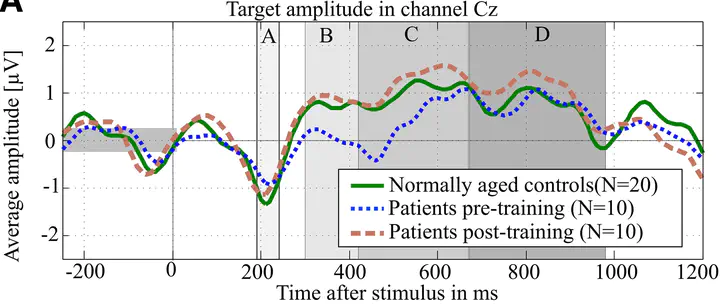Language-training induced changes of ERPs (amplitude, peak delay, onset) in stroke patients with aphasia
Does the P300 onset indicate training progress of a BCI-supported language rehabilitation training?

Context
Left-hemispheric stroke can lead to different language deficits, which are a heavy burden both, for the individual and his/her social interaction, as well as for society. While spontaneous recovery in the first weeks after the stroke may reduce this so-called aphasia, many patients remain with different language problems also in the chronic phase. The rehabilitation of these stroke-induced language deficits can be brought forward in chronic patients with a novel BCI-based training approach developed in our research group. The training comprises the presentation of sequences of words and requires patients to focus their attention to target words while ignoring non-target words. The training so far has been tested successfully in a pilot trial (see https://doi.org/10.1093/braincomms/fcac008). During the training, the BCI system evaluates event-related potentials (ERPs) that are evoked by both, target and non-target words.
Research question
To better understand the underlying mechanisms of the observed training success, we would like to investigate the following question:
Can changes of P300 ERP peaks inform about the training progress during language training of patients with aphasia?
Skills required:
- BCI background by accomplished course SOW-BKI 323 or SOW-MKI 74
- Good programming skills in Python (familiarity with numpy, sklearn, at least one popular deep learning framework).
- Good mathematical background and intuition.
- Machine learning background